We wouldn’t dream of abandoning our vast semi–annual Most Anticipated Book Previews, but we thought a monthly reminder would be helpful (and give us a chance to note titles we missed the first time around). Here’s what we’re looking out for this month. Let us know what you’re looking forward to in the comments!
Want to know about the books you might have missed? Then go read our most recent book preview. Want to help The Millions keep churning out great books coverage? Then sign up to be a member today.
 Palmares by Gayl Jones: A signal event in publishing, this is the first of five of Jones’s new novels to be published after 20 years without a new book from the brilliant author of Corregidora, among other novels. (Read more about Jones’s career in this piece by Calvin Baker.) Palmares is a sprawling story set in 17th-century Brazil, and follows an enslaved woman named Almeyda who escapes to a fugitive slave settlement and embarks on a journey to find her lost husband. Imani Perri says that Jones’s work “represents a watershed in American literature. From a literary standpoint, her form is impeccable; from a historical standpoint, she stands at the very cutting edge of understanding the modern world, and as a Black woman writer, her truth-telling, filled with beauty, tragedy, humor, and incisiveness, is unmatched. Jones is a writer’s writer, and her influence is found everywhere.” (Lydia)
Palmares by Gayl Jones: A signal event in publishing, this is the first of five of Jones’s new novels to be published after 20 years without a new book from the brilliant author of Corregidora, among other novels. (Read more about Jones’s career in this piece by Calvin Baker.) Palmares is a sprawling story set in 17th-century Brazil, and follows an enslaved woman named Almeyda who escapes to a fugitive slave settlement and embarks on a journey to find her lost husband. Imani Perri says that Jones’s work “represents a watershed in American literature. From a literary standpoint, her form is impeccable; from a historical standpoint, she stands at the very cutting edge of understanding the modern world, and as a Black woman writer, her truth-telling, filled with beauty, tragedy, humor, and incisiveness, is unmatched. Jones is a writer’s writer, and her influence is found everywhere.” (Lydia)
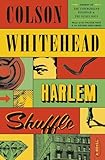 Harlem Shuffle by Colson Whitehead: Anyone who’s read the author’s The Colossus of New York knows no one writes more expansively and lovingly about New York City than Whitehead. Reminiscent of the work of Chester Himes, Harlem Shuffle starts with a heist and plays out in a beautifully recreated New York City of the early 1960s. A family saga, a genre-bending a social novel about race and power, and ultimately a love letter to New York, particularly Harlem. (Marie)
Harlem Shuffle by Colson Whitehead: Anyone who’s read the author’s The Colossus of New York knows no one writes more expansively and lovingly about New York City than Whitehead. Reminiscent of the work of Chester Himes, Harlem Shuffle starts with a heist and plays out in a beautifully recreated New York City of the early 1960s. A family saga, a genre-bending a social novel about race and power, and ultimately a love letter to New York, particularly Harlem. (Marie)
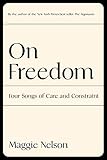 On Freedom: Four Songs of Care and Constraint by Maggie Nelson: Nelson returns to her signature blend of theory, scholarship, criticism, and personal revelation with a meditation on the thorny word “freedom,” and what it means in the world we live in today. In a starred review, Publishers Weekly writes, “Once again, Nelson proves herself a masterful thinker and an unparalleled prose stylist.” (Lydia)
On Freedom: Four Songs of Care and Constraint by Maggie Nelson: Nelson returns to her signature blend of theory, scholarship, criticism, and personal revelation with a meditation on the thorny word “freedom,” and what it means in the world we live in today. In a starred review, Publishers Weekly writes, “Once again, Nelson proves herself a masterful thinker and an unparalleled prose stylist.” (Lydia)
 The Spectacular by Zoe Whittall: Whittall’s third novel, The Best Kind of People, was shortlisted for the Scotiabank Giller Prize. She’s also a screenwriter with credits like The Baroness Von Sketch Show and Schitt’s Creek. This novel tells the story of a 22-year-old woman named Missy who is in a famous band; her mother, Carola, who is recovering from a sex scandal at a yoga center; and grandmother Ruth, who is 83 when Missy winds up crashing at her house. The three stories weave around questions about motherhood: what if you regretted it? Kristen Arnett says, “Whittall addresses motherhood and autonomy in ways I’ve never seen done before.” (Claire)
The Spectacular by Zoe Whittall: Whittall’s third novel, The Best Kind of People, was shortlisted for the Scotiabank Giller Prize. She’s also a screenwriter with credits like The Baroness Von Sketch Show and Schitt’s Creek. This novel tells the story of a 22-year-old woman named Missy who is in a famous band; her mother, Carola, who is recovering from a sex scandal at a yoga center; and grandmother Ruth, who is 83 when Missy winds up crashing at her house. The three stories weave around questions about motherhood: what if you regretted it? Kristen Arnett says, “Whittall addresses motherhood and autonomy in ways I’ve never seen done before.” (Claire)
 Bewilderment by Richard Powers: Powers follows The Overstory with a family story, which is also an earth story, about an astrobiologist struggling to raise his angry nine-year-old in the wake of his mother’s death, including using an experimental treatment that involves using the recorded patterns of her brain. In a starred review, Kirkus calls the novel a “taut ecological parable…A touching novel that offers a vital message with uncommon sympathy and intelligence.” (Lydia)
Bewilderment by Richard Powers: Powers follows The Overstory with a family story, which is also an earth story, about an astrobiologist struggling to raise his angry nine-year-old in the wake of his mother’s death, including using an experimental treatment that involves using the recorded patterns of her brain. In a starred review, Kirkus calls the novel a “taut ecological parable…A touching novel that offers a vital message with uncommon sympathy and intelligence.” (Lydia)
 Matrix by Lauren Groff: Groff’s highly anticipated first new novel since Fates and Furies tackles the desire, creativity, and vision of women following “Marie of France” (based on based on 12th-century poet Marie de France) in an arc that covers actual historic event from the Crusades to the papal interdict of 1208. (Marie)
Matrix by Lauren Groff: Groff’s highly anticipated first new novel since Fates and Furies tackles the desire, creativity, and vision of women following “Marie of France” (based on based on 12th-century poet Marie de France) in an arc that covers actual historic event from the Crusades to the papal interdict of 1208. (Marie)
 The Book of Form and Emptiness by Ruth Ozeki: The marvelous Ozeki—novelist, filmmaker, and Buddhist priest—publishes her first novel since A Tale for the Time Being. The new book is the story of Benny Oh, who hears voices—the voices of things that surround him, voices that become more and more insistent as his life becomes more and more chaotic. With her characteristic charm, empathy, and perspicacity, Ozeki writes Benny’s story of learning to hear, and manage, the voices, and hear himself along the way. David Mitchell says “This compassionate novel of life, love and loss glows in the dark. Its strange, beautiful pages turn themselves. If you’ve lost your way with fiction over the last year or two, let The Book of Form and Emptiness light your way home.” (Lydia)
The Book of Form and Emptiness by Ruth Ozeki: The marvelous Ozeki—novelist, filmmaker, and Buddhist priest—publishes her first novel since A Tale for the Time Being. The new book is the story of Benny Oh, who hears voices—the voices of things that surround him, voices that become more and more insistent as his life becomes more and more chaotic. With her characteristic charm, empathy, and perspicacity, Ozeki writes Benny’s story of learning to hear, and manage, the voices, and hear himself along the way. David Mitchell says “This compassionate novel of life, love and loss glows in the dark. Its strange, beautiful pages turn themselves. If you’ve lost your way with fiction over the last year or two, let The Book of Form and Emptiness light your way home.” (Lydia)
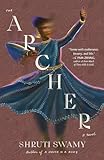 The Archer by Shruti Swamy: Following her collection of short stories, A House Is a Body, which Kiese Laymon called “one of the greatest short story collections of the 2020s,” Swamy returns with a novel set in the Bombay of the 1960s and 1970s, following a young woman named Vidya as she pursues the art form of Kathak, an exacting dance, and confronts the dilemmas that pit art against the demands of wifehood in her time and place. C Pam Zhang called the novel “lush and sensual, tasted and felt, with striking images that play out like film behind the eyes. Swamy evokes an India that resists flat stereotype and teems with exuberance, beauty, and life. The Archer is timeless yet utterly modern as it asks what it means for a woman to make a life of art.” (Lydia)
The Archer by Shruti Swamy: Following her collection of short stories, A House Is a Body, which Kiese Laymon called “one of the greatest short story collections of the 2020s,” Swamy returns with a novel set in the Bombay of the 1960s and 1970s, following a young woman named Vidya as she pursues the art form of Kathak, an exacting dance, and confronts the dilemmas that pit art against the demands of wifehood in her time and place. C Pam Zhang called the novel “lush and sensual, tasted and felt, with striking images that play out like film behind the eyes. Swamy evokes an India that resists flat stereotype and teems with exuberance, beauty, and life. The Archer is timeless yet utterly modern as it asks what it means for a woman to make a life of art.” (Lydia)
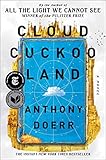 Cloud Cuckoo Land by Anthony Doerr: In 2014, Doerr’s breakout World War II novel All the Light We Cannot See managed to package abstruse physics and a sympathetic young Nazi into a thinking person’s literary thriller that dominated the bestseller lists for months. Seven years later, Doerr is back with another history-driven tale of a long-lost Greek manuscript, which turns up in the library of a spaceship seeking a habitable planet in the 22nd century. Other chapters take place during the 1453 siege of Constantinople and in present-day Idaho. “This is a marvel,” says an early review in Publishers Weekly. (Michael)
Cloud Cuckoo Land by Anthony Doerr: In 2014, Doerr’s breakout World War II novel All the Light We Cannot See managed to package abstruse physics and a sympathetic young Nazi into a thinking person’s literary thriller that dominated the bestseller lists for months. Seven years later, Doerr is back with another history-driven tale of a long-lost Greek manuscript, which turns up in the library of a spaceship seeking a habitable planet in the 22nd century. Other chapters take place during the 1453 siege of Constantinople and in present-day Idaho. “This is a marvel,” says an early review in Publishers Weekly. (Michael)
 How to Wrestle a Girl by Venita Blackburn: The second collection by the author of Black Jesus and Other Superheroes is a series of fiercely observant stories, many of which follow a teenage girl in the aftermath of her father’s death. Set in Southern California, these stories follow her as she grapples with her emerging queer identity, along with the challenges of her life at school and her kinetic and complicated family. In other stories, we see a class of teenagers torment their teacher to the point of mental collapse, as well as another story in which a different group of teens devise a scheme to sell their excess fat and skin. (Thom)
How to Wrestle a Girl by Venita Blackburn: The second collection by the author of Black Jesus and Other Superheroes is a series of fiercely observant stories, many of which follow a teenage girl in the aftermath of her father’s death. Set in Southern California, these stories follow her as she grapples with her emerging queer identity, along with the challenges of her life at school and her kinetic and complicated family. In other stories, we see a class of teenagers torment their teacher to the point of mental collapse, as well as another story in which a different group of teens devise a scheme to sell their excess fat and skin. (Thom)
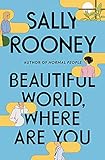 Beautiful World, Where Are You by Sally Rooney: The most widely read, discussed, and argued-about literary novelist of the last five years, Sally Rooney, returns in September with Beautiful World, Where Are You. The contours will sound familiar to anyone versed in Rooneyana: a quartet of friends—Alice, Felix, Eileen, and Simon—travel, have sex, worry about having sex, worry about themselves and their friendships and aging into adulthood in a very uncertain world. But while Rooney’s plot contrivances may occasionally, at least in summary, seem pat and prefab, her keen and tersely delivered observations about the follies of youth, sex, and friendships never are. (Adam Price)
Beautiful World, Where Are You by Sally Rooney: The most widely read, discussed, and argued-about literary novelist of the last five years, Sally Rooney, returns in September with Beautiful World, Where Are You. The contours will sound familiar to anyone versed in Rooneyana: a quartet of friends—Alice, Felix, Eileen, and Simon—travel, have sex, worry about having sex, worry about themselves and their friendships and aging into adulthood in a very uncertain world. But while Rooney’s plot contrivances may occasionally, at least in summary, seem pat and prefab, her keen and tersely delivered observations about the follies of youth, sex, and friendships never are. (Adam Price)
 Chronicles from the Happiest People on Earth by Wole Soyinka: The first new novel in 50 years from the Nobel laureate in literature. Chronicles, the third novel from Soyinka, best known for his award-winning plays and poetry (and life of essential political activism), is part whodunit, part social indictment, and as powerful as anything that came before. A Nigerian doctor realizes someone is selling body parts from his hospital for use in ritualistic practices, and with the help of an old friend, he begins to search for the thief—but neither realizes how far the search will take them. Toni Morrison once praised Soyinka, saying “You don’t see things the same when you encounter a voice like that,” and here that voice still has all of its power, wit, beauty, and purpose. (Kaulie)
Chronicles from the Happiest People on Earth by Wole Soyinka: The first new novel in 50 years from the Nobel laureate in literature. Chronicles, the third novel from Soyinka, best known for his award-winning plays and poetry (and life of essential political activism), is part whodunit, part social indictment, and as powerful as anything that came before. A Nigerian doctor realizes someone is selling body parts from his hospital for use in ritualistic practices, and with the help of an old friend, he begins to search for the thief—but neither realizes how far the search will take them. Toni Morrison once praised Soyinka, saying “You don’t see things the same when you encounter a voice like that,” and here that voice still has all of its power, wit, beauty, and purpose. (Kaulie)
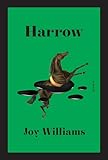 Harrow by Joy Williams: This novel, Williams’s first in two decades, follows the unlikely (and aged) rebels who sabotage corporations for their complicity in environmental destruction. Who better than Williams to capture pure-hearted but absurd efforts to retrieve paradise lost? (Nick M.)
Harrow by Joy Williams: This novel, Williams’s first in two decades, follows the unlikely (and aged) rebels who sabotage corporations for their complicity in environmental destruction. Who better than Williams to capture pure-hearted but absurd efforts to retrieve paradise lost? (Nick M.)
 Misfits by Michaela Coel: I May Destroy You was some of the most powerful television I have seen in recent years, an incredible exploration of trauma, violence, work, friendship, social media, and art (complete with a storyline about writers’ block). Subtitled A Personal Manifesto, Misfits is a book from Coel, who is both the brilliant mind behind the show and its star, built off the MacTaggart Lecture she delivered at the Edinburgh International Television Festival. Coel weaves stories of her own life with a call to honesty and action for everyone who has struggled to fit in. (Lydia)
Misfits by Michaela Coel: I May Destroy You was some of the most powerful television I have seen in recent years, an incredible exploration of trauma, violence, work, friendship, social media, and art (complete with a storyline about writers’ block). Subtitled A Personal Manifesto, Misfits is a book from Coel, who is both the brilliant mind behind the show and its star, built off the MacTaggart Lecture she delivered at the Edinburgh International Television Festival. Coel weaves stories of her own life with a call to honesty and action for everyone who has struggled to fit in. (Lydia)
 Martita, I Remember You by Sandra Cisneros (translated by Liliana Valenzuela): The legendary Cisneros returns with a novel published as a dual English-Spanish edition, a story of a woman who leaves her Mexican American family in Chicago and spends wild young days in Paris, forming a friendship with two other women that resurfaces years later with the chance discovery of an old letter. (Lydia)
Martita, I Remember You by Sandra Cisneros (translated by Liliana Valenzuela): The legendary Cisneros returns with a novel published as a dual English-Spanish edition, a story of a woman who leaves her Mexican American family in Chicago and spends wild young days in Paris, forming a friendship with two other women that resurfaces years later with the chance discovery of an old letter. (Lydia)
 The Wrong End of the Telescope by Rabih Alameddine: National Book Award finalist Alameddine’s sixth novel tells the story of Mina Simpson, a Lebanese doctor and trans woman who travels to the Greek island of Lesbos to provide aid at an infamous refugee camp. For decades, Mina has avoided traveling so close to her homeland, but she decided to visit the camp to accomplish something meaningful. But when she meets Sumaiya, a Syrian woman with terminal liver cancer, and tries to chart a course of treatment with the limited resources on the island, she’s forced to reckon with the scale of the migrants’ suffering, along with as her own limitations. (Thom)
The Wrong End of the Telescope by Rabih Alameddine: National Book Award finalist Alameddine’s sixth novel tells the story of Mina Simpson, a Lebanese doctor and trans woman who travels to the Greek island of Lesbos to provide aid at an infamous refugee camp. For decades, Mina has avoided traveling so close to her homeland, but she decided to visit the camp to accomplish something meaningful. But when she meets Sumaiya, a Syrian woman with terminal liver cancer, and tries to chart a course of treatment with the limited resources on the island, she’s forced to reckon with the scale of the migrants’ suffering, along with as her own limitations. (Thom)
 A Calling for Charlie Barnes by Joshua Ferris: Acclaimed novelist and short story writer Ferris returns in 2021 with A Calling for Charlie Barnes. Charlie Barnes, a multiply divorced romantic and schemer whose hopes for delivery are dashed by the financial crisis and a medical disaster, gets one more chance for redemption in the form of his storytelling son. Ferris is one of the master chroniclers of our declining American empire and spirit—his special gift is delivering the bad news with both laughs and an enormous amount of empathy that, at his best, recalls the work of Emerson and Thoreau. In the words of Dana Spiotta, “Joshua Ferris is one of our best writers, and A Calling for Charlie Barnes is wonderful: fast and deep, urgent and brilliant. Ingeniously written, it had me up reading late into the night. A hilarious, intimate, and scathing takedown of so many American vanities.” (Adam Price)
A Calling for Charlie Barnes by Joshua Ferris: Acclaimed novelist and short story writer Ferris returns in 2021 with A Calling for Charlie Barnes. Charlie Barnes, a multiply divorced romantic and schemer whose hopes for delivery are dashed by the financial crisis and a medical disaster, gets one more chance for redemption in the form of his storytelling son. Ferris is one of the master chroniclers of our declining American empire and spirit—his special gift is delivering the bad news with both laughs and an enormous amount of empathy that, at his best, recalls the work of Emerson and Thoreau. In the words of Dana Spiotta, “Joshua Ferris is one of our best writers, and A Calling for Charlie Barnes is wonderful: fast and deep, urgent and brilliant. Ingeniously written, it had me up reading late into the night. A hilarious, intimate, and scathing takedown of so many American vanities.” (Adam Price)
 The Water Statues by Fleur Jaeggy (translated by Gini Alhadeff): Even when considered alongside Jaeggy’s other singular and slim novels, The Water Statues is a peculiar book. Within, Jaeggy tells the story of family and isolation, and the inheritance of loneliness and emotional poverty that accompanies wealth (in line with Orson Welles’s Citizen Kane, though that’s where comparisons end). This “strange and shimmering nonlinear text” is voluptuous yet melancholic and austere. Which seems in line with Jaeggy’s profession that, “One should be in one’s own void. Void is silence. Solitude. An absence of relationships…The void is a plant that must continually be watered.” (Anne)
The Water Statues by Fleur Jaeggy (translated by Gini Alhadeff): Even when considered alongside Jaeggy’s other singular and slim novels, The Water Statues is a peculiar book. Within, Jaeggy tells the story of family and isolation, and the inheritance of loneliness and emotional poverty that accompanies wealth (in line with Orson Welles’s Citizen Kane, though that’s where comparisons end). This “strange and shimmering nonlinear text” is voluptuous yet melancholic and austere. Which seems in line with Jaeggy’s profession that, “One should be in one’s own void. Void is silence. Solitude. An absence of relationships…The void is a plant that must continually be watered.” (Anne)
 The Magician by Colm Tóibín: Scribner describes Tóibín’s most recent project as “a stunning marriage of research and imagination” in this, his exploration of the life and art of Thomas Mann. Tóibín’s refined gift is about as perfect a match as could be imagined for the construction of a nuanced portrait of a complicated man and artist living in a complex period of modern history. (Il’ja)
The Magician by Colm Tóibín: Scribner describes Tóibín’s most recent project as “a stunning marriage of research and imagination” in this, his exploration of the life and art of Thomas Mann. Tóibín’s refined gift is about as perfect a match as could be imagined for the construction of a nuanced portrait of a complicated man and artist living in a complex period of modern history. (Il’ja)
 Heart Radical by Anne Liu Kellor: Kellor’s memoir describes her travels through China as a young multiracial woman, relaying her years living in China, falling in love, speaking her mother tongue, working, traveling, and searching for what called her to a place that is both familiar and not. Cheryl Strayed said of the memoir, “I loved this book. It’s vulnerable, searching, insightful, riveting and beautifully written.” (Lydia)
Heart Radical by Anne Liu Kellor: Kellor’s memoir describes her travels through China as a young multiracial woman, relaying her years living in China, falling in love, speaking her mother tongue, working, traveling, and searching for what called her to a place that is both familiar and not. Cheryl Strayed said of the memoir, “I loved this book. It’s vulnerable, searching, insightful, riveting and beautifully written.” (Lydia)
 Hao by Ye Chun: A collection of stories that take place in China and America within the Chinese Diaspora, spanning time and place and focusing on the lives and struggles of women as they wrestle with everything that attends migration, motherhood, and personhood. Lynn Steger Strong says of the collection, “Each of these stories is an individual world brought to life fully by the particularity of its language, by Ye’s extraordinarily far-reaching and deeply felt imagination, combined with her consistently stunning acuity and control.” (Lydia)
Hao by Ye Chun: A collection of stories that take place in China and America within the Chinese Diaspora, spanning time and place and focusing on the lives and struggles of women as they wrestle with everything that attends migration, motherhood, and personhood. Lynn Steger Strong says of the collection, “Each of these stories is an individual world brought to life fully by the particularity of its language, by Ye’s extraordinarily far-reaching and deeply felt imagination, combined with her consistently stunning acuity and control.” (Lydia)
 Kaya Days by Carl de Souza (translated by Jeffrey Zuckerman): Named for the days of protest and mourning that followed the death of Mauritian musician Joseph Réginald Topize, or Kaya, at the hands of police, the debut novel by de Souza follows a woman through Mauritius as she searches for her missing brother, delineating the many intersecting worlds of the island nation at a revolutionary moment. J.M.G. Le Clézio calls the novel “a searing, urgent, far-seeing dispatch that imprints the reality of Mauritius, at odds with its picture-postcard views, on the global consciousness. Carl de Souza is a formidable voice in Mauritian literature; his account is an indictment and a plea for understanding among its communities.” (Lydia)
Kaya Days by Carl de Souza (translated by Jeffrey Zuckerman): Named for the days of protest and mourning that followed the death of Mauritian musician Joseph Réginald Topize, or Kaya, at the hands of police, the debut novel by de Souza follows a woman through Mauritius as she searches for her missing brother, delineating the many intersecting worlds of the island nation at a revolutionary moment. J.M.G. Le Clézio calls the novel “a searing, urgent, far-seeing dispatch that imprints the reality of Mauritius, at odds with its picture-postcard views, on the global consciousness. Carl de Souza is a formidable voice in Mauritian literature; his account is an indictment and a plea for understanding among its communities.” (Lydia)
 The Morning Store by Karl Ove Knausgaard (translated by Martin Aitken): The mega-popular Norwegian author’s latest novel centers on a cast of characters who witness a bizarre astronomical phenomenon. On a normal night in August, a group of tangentially related people in the Norwegian resort town of Sørlandet watch as a massive star suddenly appears in the night sky. No one—including the astronomers—knows just what the star is or why it appeared. The days wear on, unusual and baffling things begin to occur, and the characters grapple with these events and their impact on their lives. (Thom)
The Morning Store by Karl Ove Knausgaard (translated by Martin Aitken): The mega-popular Norwegian author’s latest novel centers on a cast of characters who witness a bizarre astronomical phenomenon. On a normal night in August, a group of tangentially related people in the Norwegian resort town of Sørlandet watch as a massive star suddenly appears in the night sky. No one—including the astronomers—knows just what the star is or why it appeared. The days wear on, unusual and baffling things begin to occur, and the characters grapple with these events and their impact on their lives. (Thom)
 Inter State by José Vadi: As award-winning writer Vadi examines California with anger and love in his first essay collection, he centers the ever-changing Golden State and includes wildfires, dive bars, the tech industry, farmwork, decay, and wealth. Nina Renata Aron describes Vadi as an “ethnographer-on-a-skateboard” and Publishers Weekly describes the book as “part love letter, part indictment.” Vadi’s writing style has received much advanced praise: Kirkus says that “at a line level, the book is outstanding, filled with long, breathless sentences, innovative syntax,” and Melissa Valentine recommends that “with smart prose and daring form, these are perfect essays for our complicated times.” (Zoë)
Inter State by José Vadi: As award-winning writer Vadi examines California with anger and love in his first essay collection, he centers the ever-changing Golden State and includes wildfires, dive bars, the tech industry, farmwork, decay, and wealth. Nina Renata Aron describes Vadi as an “ethnographer-on-a-skateboard” and Publishers Weekly describes the book as “part love letter, part indictment.” Vadi’s writing style has received much advanced praise: Kirkus says that “at a line level, the book is outstanding, filled with long, breathless sentences, innovative syntax,” and Melissa Valentine recommends that “with smart prose and daring form, these are perfect essays for our complicated times.” (Zoë)
 Margaret and the Mystery of the Missing Body by Megan Milks: Margaret, the once head dectective of the Girls Can Solve Anything club, is at a major crossroads in her life: her friends have abandoned her; she’s developed an all-consuming eating disorder; and she would rather solve cases than grow up. When she enters inpatient treatment for her anorexia, Margaret dusts off her dectective skills to solve mysteries—including, and especially, how to live and grow and become the person you’re meant to be. About Milks’ genre-bending debut novel, Torrey Peters writes: “What if all those nineties book series about girlhood had been truly honest about the process of growing up? You’d get this wonderful book: a comforting facade that opens into an entrancing and wildly innovative gut-renovation of the genre, with an interior that lays bare the hidden workings of life I wish I’d known on my own first run through adolescence. Brilliant.” (Carolyn)
Margaret and the Mystery of the Missing Body by Megan Milks: Margaret, the once head dectective of the Girls Can Solve Anything club, is at a major crossroads in her life: her friends have abandoned her; she’s developed an all-consuming eating disorder; and she would rather solve cases than grow up. When she enters inpatient treatment for her anorexia, Margaret dusts off her dectective skills to solve mysteries—including, and especially, how to live and grow and become the person you’re meant to be. About Milks’ genre-bending debut novel, Torrey Peters writes: “What if all those nineties book series about girlhood had been truly honest about the process of growing up? You’d get this wonderful book: a comforting facade that opens into an entrancing and wildly innovative gut-renovation of the genre, with an interior that lays bare the hidden workings of life I wish I’d known on my own first run through adolescence. Brilliant.” (Carolyn)
 The Body Scout by Lincoln Michel: Set in a distant (and increasingly possible) future devastated by climate change and endless pandemics, Kobo—a body-hacker who works as a baseball scout for Big Phrama-owne baseball teams—is struggling. When his brother is murdered on the baseball field, Kobo dives into a dangerous and corrupt underworld to hunt down the killer. “This novel is delightful in its brio and sharp as a tack in its inventiveness—and yet its greatest, most poignant gift is in asking: What does it mean to inhabit a body? A superb read,” says Esmé Weijun Wang. (Carolyn).
The Body Scout by Lincoln Michel: Set in a distant (and increasingly possible) future devastated by climate change and endless pandemics, Kobo—a body-hacker who works as a baseball scout for Big Phrama-owne baseball teams—is struggling. When his brother is murdered on the baseball field, Kobo dives into a dangerous and corrupt underworld to hunt down the killer. “This novel is delightful in its brio and sharp as a tack in its inventiveness—and yet its greatest, most poignant gift is in asking: What does it mean to inhabit a body? A superb read,” says Esmé Weijun Wang. (Carolyn).
 Letters to Amelia by Lindsay Zier-Vogel: Zier-Vogel‘s debut novel follows 30-year-old Grace Porter, who is grieving the sudden end of her longterm relationship, as she discovers the love letters between Amelia Earhart and her lover, Gene Vidal. After Grace discovers she’s pregnant, she begins writing her own letters to Amelia—and searching for answers as to what happened to the infamous pilot. Jon McGregor calls Letters to Amelia “a wonderful novel about flight and passion, about love-letters and reaching out; a novel about how we never know quite what’s coming next, but still keep launching ourselves into the blue tomorrow.” (Carolyn)
Letters to Amelia by Lindsay Zier-Vogel: Zier-Vogel‘s debut novel follows 30-year-old Grace Porter, who is grieving the sudden end of her longterm relationship, as she discovers the love letters between Amelia Earhart and her lover, Gene Vidal. After Grace discovers she’s pregnant, she begins writing her own letters to Amelia—and searching for answers as to what happened to the infamous pilot. Jon McGregor calls Letters to Amelia “a wonderful novel about flight and passion, about love-letters and reaching out; a novel about how we never know quite what’s coming next, but still keep launching ourselves into the blue tomorrow.” (Carolyn)
 Assembly by Natasha Brown: Assembly‘s young, successful, Black protagonist is wondering how she can take control of her life while navigating a toxic career, contemplating her relationship with her wealthy white boyfriend, and worrying over potential life-or-death decision. Brown’s debut novel is a slim but affecting portrayal of the race, class, and sexual politics in contemporary Britain. Booker winner Bernardine Evaristo says: “Natasha Brown’s exquisite prose, daring structure and understated elegance are utterly captivating. She is a stunning new writer.” (Carolyn)
Assembly by Natasha Brown: Assembly‘s young, successful, Black protagonist is wondering how she can take control of her life while navigating a toxic career, contemplating her relationship with her wealthy white boyfriend, and worrying over potential life-or-death decision. Brown’s debut novel is a slim but affecting portrayal of the race, class, and sexual politics in contemporary Britain. Booker winner Bernardine Evaristo says: “Natasha Brown’s exquisite prose, daring structure and understated elegance are utterly captivating. She is a stunning new writer.” (Carolyn)
 Other Girls to Burn by Caroline Crew: Winner of the Sue William Silverman Prize in Creative Nonfiction, Crew’s essay collection blends cultural criticism and personal essay to explore the relationship between women and violence. Alexander Chee, who selected the collection for the prize, says: “The world turns in Crew’s vision, essay by essay, renewed or revealed in ways only she can provide, and all of it brought to us in a voice I’d follow into any topic—propulsive, lyrical, able to turn on a dime, as the expression goes. . . . An unforgettable debut. ” (Carolyn)
Other Girls to Burn by Caroline Crew: Winner of the Sue William Silverman Prize in Creative Nonfiction, Crew’s essay collection blends cultural criticism and personal essay to explore the relationship between women and violence. Alexander Chee, who selected the collection for the prize, says: “The world turns in Crew’s vision, essay by essay, renewed or revealed in ways only she can provide, and all of it brought to us in a voice I’d follow into any topic—propulsive, lyrical, able to turn on a dime, as the expression goes. . . . An unforgettable debut. ” (Carolyn)
 Beautiful Country by Qian Julie Wang: In her debut, coming-of-age memoir, Wang writes about moving to and living in New York City as an undocumented immigrant—as her family seeks out the ever-present and alluring American Dream. “Beautiful Country is the real deal,” writes Gish Jen. “Heartrending, unvarnished, and powerfully courageous, this account of growing up undocumented in America will never leave you.” (Carolyn)
Beautiful Country by Qian Julie Wang: In her debut, coming-of-age memoir, Wang writes about moving to and living in New York City as an undocumented immigrant—as her family seeks out the ever-present and alluring American Dream. “Beautiful Country is the real deal,” writes Gish Jen. “Heartrending, unvarnished, and powerfully courageous, this account of growing up undocumented in America will never leave you.” (Carolyn)
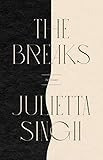 The Breaks by Julietta Singh: In her newest work of nonfiction, Singh (No Archive Will Restore You) writes a gorgeous and poetic letter to her six-year-old daughter about everything from late-stage capitalism and climate change to queer families and parenting “at the end of the world.” Publishers Weekly’s starred review calls the slim books “a stunning work.” (Carolyn)
The Breaks by Julietta Singh: In her newest work of nonfiction, Singh (No Archive Will Restore You) writes a gorgeous and poetic letter to her six-year-old daughter about everything from late-stage capitalism and climate change to queer families and parenting “at the end of the world.” Publishers Weekly’s starred review calls the slim books “a stunning work.” (Carolyn)









